
Battling Cancer and Saving Lives Require a Pro-Innovation Environment in New Jersey
By Dean J. Paranicas, President and CEO, HealthCare Institute of New Jersey (HINJ) On Nov 28, 2016Amid the media headlines in October, one in The New York Times shimmered above the rest: “Cancer in Retreat on One Front: Fewer Children Are Dying.”
The Times reported that, according to the National Center for Health Statistics, overall deaths from childhood cancer fell by 20 percent from 1999 to 2014, attributable to changes in standards of care, better prognostic tools and new cancer medications and treatments.
This was just the latest encouraging news relating to cancer survival and medical innovation in recent years. Most notably, according to the American Cancer Society, the cancer mortality rate has fallen 23 percent from its peak in 1991, and the number of US cancer survivors has increased from 3 million in 1971 to 14.5 million in 2014.
Many factors contributed to the improved cancer survivorship census. Significantly, as reported in the May 2008 issue of the Journal of Clinical Oncology, 83 percent of survival gains in cancer were attributable to new oncology treatments.
As heartening as these numbers are, they reflect what has been accomplished. As we look out over the medical innovation horizon, we eagerly look toward what could materialize that will further benefit cancer patients around the globe.
The good news is that many cancer-related treatments and technologies are emerging in labs in New Jersey and elsewhere that promise patients a bright future.
The Pharmaceutical Research and Manufacturers of America (PhRMA) in September 2015 reported that 836 medicines and vaccines for cancer were in clinical trials or awaiting review by the US Food and Drug Administration.
Impressively, of that total, PhRMA reported that 267 medicines – including for treatment of leukemia, lymphoma, cervical, lung, colorectal, breast, skin and pediatric cancers – were in or from companies’ New Jersey laboratories. That is nearly 32 percent of all cancer research-and-development (R&D) activity last year, further advancing our state’s historic reputation as the “Medicine Chest of the World.”
The PhRMA study also reported that – driven by advanced molecular and genomic research – approximately 80 percent of cancer drugs in the R&D pipeline are potentially first-in-class medicines (a drug with a new and unique mechanism for treating a condition), and 73 percent have the potential to be personalized medicines (a drug that is tailored to the individual patient, based on his or her predicted response or risk of disease).
We thus stand poised for even more remarkable change and progress in cancer care. Increased screening, early detection, as well as therapeutic and technological advances, are transforming the treatment paradigm for many.
Emerging scientific and clinical advancements – including in immunotherapy, which is revolutionizing the treatment of advanced cancers – are expanding medical professionals’ and life sciences researchers’ knowledge of how the disease develops and how to target medicines for specific cancer types, which will result in even more effective therapies for patients.
Cancer mortality rates promise to improve even more dramatically as life sciences companies – including those in the biopharmaceutical, biotechnology, medical technology, device and diagnostics sectors, many here in New Jersey – apply this knowledge and bring to the global market more medical innovations that combat cancer.
However, central to continued progress is a shared commitment to maintaining a policy, regulatory and business environment that is pro-innovation and pro-patient.
Medical innovation is complex, high-risk, time-consuming and extremely expensive. Yet, the return on investment – diminished suffering, decreased mortality as well as reducing the enormous cost burden for cancer patients, their families and our healthcare system – is enormous.
Consequently, the life sciences community, policymakers, healthcare providers, research universities and the greater business community – in New Jersey and around the globe – must continue to collaborate in ways that nurture, rather than stifle, the virtuous cycle of better health, longer life and economic benefits resulting from medical innovation.
The HealthCare Institute of New Jersey (HINJ) is committed to this mission so that life sciences companies across the state can continue to battle cancer in innovative ways that will further enhance and save the lives of patients around the world.
Related Articles:






